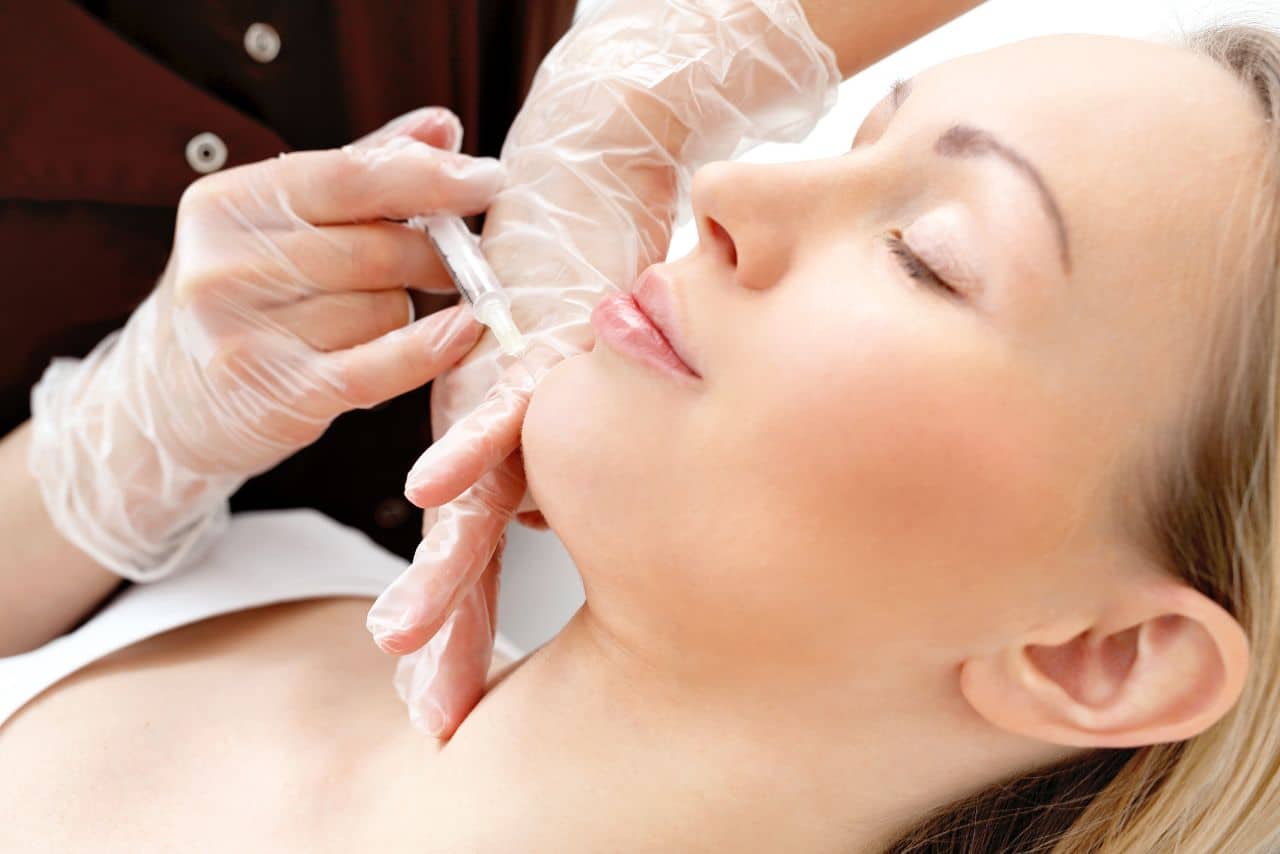
Mesotherapy is a minimally invasive cosmetic treatment that involves injecting a mixture of vitamins, minerals, amino acids, and other nutrients directly into the mesoderm, or middle layer of skin. This treatment has gained popularity in recent years due to its versatility and effectiveness in treating a range of conditions.
Mesotherapy can be used for a variety of purposes, including anti-aging, hair restoration, cellulite reduction, and weight loss. It has also been shown to be effective in treating certain medical conditions, such as osteoarthritis and chronic pain.
While mesotherapy is generally safe, it is important to understand the potential risks and side effects before undergoing treatment. In this article, we will explore the benefits and risks of mesotherapy and answer some common questions about the treatment.
What Are The Benefits of Mesotherapy?
Mesotherapy is a versatile cosmetic treatment that has been shown to have a range of benefits for various cosmetic concerns. Below are some of the most commonly reported benefits of mesotherapy.
Anti-Aging Benefits
One of the most popular uses of mesotherapy is for anti-aging purposes. The injection solution used in mesotherapy contains a blend of vitamins, minerals, and amino acids that work together to stimulate collagen production in the skin. Collagen is a protein that gives skin its elasticity and firmness. By stimulating collagen production, mesotherapy can help reduce the appearance of fine lines and wrinkles, improve skin texture and tone, and brighten and even out skin tone.
Hair Restoration Benefits
Mesotherapy has also been used to treat hair loss and promote hair growth. The injection solution used in mesotherapy can help increase blood circulation to the scalp, which can promote hair growth and thickness. Additionally, the nutrients in the solution can help nourish hair follicles, leading to stronger, healthier hair.
Cellulite Reduction Benefits
Mesotherapy can also be used to reduce the appearance of cellulite. The injection solution used in mesotherapy can help break down fat cells in cellulite-prone areas, such as the thighs and buttocks. Additionally, mesotherapy can help tighten and smooth the skin in these areas, leading to a more toned and youthful appearance.
Weight Loss Benefits
Mesotherapy has been used as a non-surgical alternative to liposuction for targeted fat reduction. The injection solution used in mesotherapy can help promote fat burning in targeted areas, such as the stomach, thighs, and arms. Additionally, mesotherapy can help boost metabolism and energy levels, helping patients maintain a healthy weight.
Treatment of Medical Conditions
Mesotherapy has also been used to treat certain medical conditions, such as osteoarthritis and chronic pain. The injection solution used in mesotherapy can help reduce inflammation and pain in affected areas, leading to improved quality of life for patients.
Risks and Side Effects of Mesotherapy
While mesotherapy is generally considered safe, there are potential risks and side effects that patients should be aware of. Below are some of the most common risks and side effects associated with mesotherapy.
Allergic Reactions
Allergic reactions are a potential risk with any injectable treatment, including mesotherapy. The ingredients in the injection solution can trigger an allergic reaction in some patients. Symptoms of an allergic reaction can range from mild itching and redness to more severe symptoms, such as difficulty breathing and anaphylaxis.
Infection
Infection is another potential risk associated with mesotherapy. The injection site can become infected if it is not properly sterilized before treatment. Symptoms of an infection can include redness, swelling, pain, and fever. In rare cases, an infection can lead to serious complications, such as sepsis.
Bruising and Swelling
Bruising and swelling are common side effects of mesotherapy. These symptoms usually resolve on their own within a few days to a week. Applying a cold compress to the injection site can help reduce swelling and bruising.
Skin Discoloration
Some patients may experience skin discoloration at the injection site. This can be a result of bruising or hyperpigmentation. In most cases, this discoloration will fade on its own within a few weeks.
Pain and Discomfort
Mild to moderate pain or discomfort at the injection site is common with mesotherapy. Patients can take over-the-counter pain relievers, such as acetaminophen or ibuprofen, to help manage their symptoms.
Nerve Damage
In rare cases, mesotherapy can cause nerve damage. This can result in numbness, tingling, or other sensory changes in the area surrounding the injection site. Patients who experience these symptoms should seek medical attention immediately.
It is important to note that the risks and side effects of mesotherapy can be minimized by choosing a qualified provider and following pre- and post-treatment instructions carefully. Patients should also disclose their full medical history to their provider to ensure that mesotherapy is safe for them.
In addition to the risks and side effects listed above, it is also possible for mesotherapy to be ineffective or produce unsatisfactory results. This can be due to a variety of factors, including individual response to treatment and the area being treated. Patients should have realistic expectations for their results and communicate their goals and concerns with their provider.
Who Should Avoid Mesotherapy?
While mesotherapy is generally considered safe, there are certain groups of people who may not be good candidates for the treatment. Below are some groups of people who should avoid mesotherapy.
- Pregnant or Breastfeeding Women – There is not enough research to determine the safety of mesotherapy during pregnancy or breastfeeding. For this reason, pregnant or breastfeeding women should avoid mesotherapy until after they have given birth or stopped breastfeeding.
- People with Certain Medical Conditions – Mesotherapy may be contraindicated for people with certain medical conditions, such as autoimmune disorders or bleeding disorders. This is because mesotherapy can stimulate the immune system and increase the risk of bleeding. Before undergoing mesotherapy, patients should disclose their full medical history to their provider to ensure that the treatment is safe for them.
- People with Skin Allergies – People with a history of severe skin allergies may be at increased risk of an allergic reaction to mesotherapy. Before undergoing mesotherapy, patients with a history of skin allergies should discuss their options with their provider.
- People on Blood-Thinning Medication – Mesotherapy may increase the risk of bleeding or bruising in people taking blood-thinning medication. Before undergoing mesotherapy, patients on blood-thinning medication should discuss their options with their provider.
- People with Unrealistic Expectations – Mesotherapy can be a very effective treatment for various cosmetic concerns, but it is important for patients to have realistic expectations for their results. Patients who are expecting dramatic or immediate results may be disappointed with the outcome of their treatment.
In addition to the groups of people listed above, it is also important for patients to choose a qualified provider for their mesotherapy treatment. Patients should look for a provider who has undergone proper training and certification in mesotherapy. Choosing an inexperienced or unqualified provider can increase the risk of complications and unsatisfactory results.
How Long Does Mesotherapy Last?
Mesotherapy is a non-surgical cosmetic treatment that can have a range of benefits, depending on the area being treated and the individual patient. One common question that patients have is how long the effects of mesotherapy will last. In this section, we will discuss how long mesotherapy lasts and what factors can affect the longevity of the treatment.
The duration of the effects of mesotherapy can vary depending on several factors, including:
- Area Being Treated – The longevity of mesotherapy can vary depending on the area being treated. For example, mesotherapy for anti-aging purposes may last longer than mesotherapy for hair restoration.
- Number of Treatments – The number of mesotherapy treatments a patient receives can affect the duration of the treatment’s effects. In general, a series of treatments is recommended for best results. The number of treatments needed can vary depending on the area being treated and the patient’s individual response to treatment.
- Individual Response to Treatment – Every patient is different and may respond differently to mesotherapy. Some patients may see longer-lasting results than others.
- Maintenance – The longevity of mesotherapy can also depend on how well a patient maintains their results. Patients who follow a healthy lifestyle, such as eating a balanced diet and exercising regularly, may see longer-lasting results than those who do not.
In general, the effects of mesotherapy can last anywhere from several months to a year or more. For example, mesotherapy for anti-aging purposes may last anywhere from 6 months to a year, depending on the patient’s individual response to treatment and how well they maintain their results. Mesotherapy for hair restoration may last several months to a year, depending on the patient’s individual response to treatment and the number of treatments they receive.
It is important to note that mesotherapy is not a permanent solution to cosmetic concerns. To maintain the results of mesotherapy, patients may need to undergo touch-up treatments every few months or so.
The longevity of mesotherapy can vary depending on several factors, including the area being treated, the number of treatments received, the patient’s individual response to treatment, and how well they maintain their results. The effects of mesotherapy can last anywhere from several months to a year or more, and touch-up treatments may be needed to maintain the results. Patients should discuss their goals and expectations with their provider to determine the best treatment plan for their individual needs.
Is Mesotherapy Really Effective?
While mesotherapy has gained popularity in recent years, some patients may wonder if it is really effective. In this section, we will discuss the effectiveness of mesotherapy and what factors can affect the results of the treatment.
Overall, mesotherapy can be an effective treatment for a variety of cosmetic concerns. Studies have shown that mesotherapy can improve skin texture and tone, reduce the appearance of wrinkles and fine lines, and promote hair growth in patients with hair loss. Additionally, many patients report a reduction in cellulite and improved body contouring after mesotherapy.
The effectiveness of mesotherapy can vary depending on several factors, as discussed above. Patients should have realistic expectations for their results and communicate their goals and concerns with their provider.
Is One Session of Mesotherapy Enough?
One common question that patients have is whether one session of mesotherapy is enough to achieve their desired results. In this section, we will discuss whether one session of mesotherapy is enough and what factors can affect the number of treatments needed.
In general, one session of mesotherapy is not enough to achieve significant and long-lasting results. Mesotherapy is typically administered in a series of treatments, with the number of treatments needed varying depending on several factors.
Patients can expect to undergo a series of mesotherapy treatments, with treatments typically spaced several weeks apart. The number of treatments needed can vary, with some patients achieving their desired results after just a few treatments, while others may require several treatments over the course of several months.
It is important to note that mesotherapy is not a quick fix for cosmetic concerns. While patients may start to see results within a few weeks of their first treatment, a series of treatments is typically recommended for best results. Additionally, the longevity of mesotherapy results can vary depending on several factors, as discussed in previous sections.
How Often Should You Do Mesotherapy?
Patients often ask how often they should undergo mesotherapy to maintain their results. In this section, we will discuss how often patients should do mesotherapy and what factors can affect the frequency of treatments.
Typically, patients can expect to undergo a series of mesotherapy treatments, with treatments typically spaced several weeks apart. The number of treatments needed can vary, with some patients achieving their desired results after just a few treatments, while others may require several treatments over the course of several months.
After the initial series of treatments, patients may choose to undergo maintenance treatments to prolong their results. The frequency of maintenance treatments can vary depending on several factors, including the area being treated, the desired results, and the patient’s individual response to treatment.
In general, maintenance treatments for mesotherapy are typically recommended every 6-12 months, although the frequency of treatments can vary depending on the patient’s individual needs. Patients should discuss their goals and expectations with their provider to determine the best treatment plan for their individual needs.
What Not to Do After Mesotherapy
After undergoing mesotherapy, it is important to follow your provider’s post-treatment instructions carefully to minimize your risk of complications and achieve the best possible results. Below are some things you should not do after mesotherapy.
Touch or Rub the Injection Site
After mesotherapy, it is important to avoid touching or rubbing the injection site. This can increase the risk of infection, bruising, and swelling.
Apply Heat to the Injection Site
Applying heat to the injection site can increase swelling and bruising. It is important to avoid hot showers, saunas, and hot compresses for at least 24-48 hours after mesotherapy.
Exercise Vigorously
Vigorous exercise can increase blood flow to the injection site and increase the risk of swelling and bruising. It is important to avoid strenuous exercise for at least 24-48 hours after mesotherapy.
Take Certain Medications
Some medications, such as aspirin and nonsteroidal anti-inflammatory drugs (NSAIDs), can increase the risk of bleeding and bruising. It is important to avoid these medications for at least 24-48 hours after mesotherapy. Your provider may recommend other pain relief options, such as acetaminophen.
Drink Alcohol
Alcohol can increase the risk of swelling and bruising. It is important to avoid alcohol for at least 24-48 hours after mesotherapy.
Smoking Cigarettes
Smoking can slow down the healing process and increase the risk of complications, such as infection and poor wound healing. It is important to avoid smoking for at least 24-48 hours after mesotherapy.
Sunbathe or Use Tanning Beds
After mesotherapy, it is important to avoid sun exposure and tanning beds. Sun exposure can increase the risk of hyperpigmentation and skin damage. It is important to wear protective clothing and sunscreen when going outside.
Undergo Certain Cosmetic Treatments
After mesotherapy, it is important to avoid certain cosmetic treatments, such as chemical peels and laser resurfacing, for at least 2 weeks. These treatments can increase the risk of skin irritation and damage.
Following your provider’s post-treatment instructions carefully is essential for minimizing your risk of complications and achieving the best possible results after mesotherapy. Patients should avoid touching or rubbing the injection site, applying heat to the injection site, exercising vigorously, taking certain medications, drinking alcohol, smoking, sunbathing or using tanning beds, and undergoing certain cosmetic treatments for at least 24-48 hours after mesotherapy.
At What Age Should I Start Mesotherapy?
Another common question that patients have is at what age they should start mesotherapy. In this section, we will discuss the age range for mesotherapy and what factors can affect the decision to undergo treatment.
Mesotherapy is generally considered safe for adult patients, and there is no specific age limit for the treatment. However, the ideal age range for mesotherapy may vary depending on the individual’s cosmetic concerns and goals.
Anti-Aging Treatments
For anti-aging treatments, patients may choose to undergo mesotherapy as early as their late 20s or early 30s to prevent the formation of fine lines and wrinkles. The treatment can also be effective for patients in their 40s and 50s to reduce the appearance of existing wrinkles and restore skin elasticity.
Hair Restoration Treatments
For hair restoration treatments, patients may choose to undergo mesotherapy as early as their 20s or 30s to promote hair growth and prevent hair loss. The treatment can also be effective for patients in their 40s and 50s to restore hair density and thickness.
Cellulite Reduction Treatments
For cellulite reduction treatments, patients may choose to undergo mesotherapy at any age to improve skin texture and reduce the appearance of cellulite.
Conclusion
Mesotherapy is a non-surgical cosmetic treatment that involves injecting a customized mixture of vitamins, minerals, and other substances into the skin. The treatment is used for a variety of cosmetic concerns, including anti-aging, hair restoration, and cellulite reduction. While mesotherapy can offer many benefits, it is important to understand the potential risks and side effects before undergoing treatment.
In this article, we discussed the benefits of mesotherapy, including improved skin texture, reduced cellulite, and hair restoration. We also explored the potential risks and side effects of mesotherapy, including bruising, swelling, infection, and allergic reactions. Additionally, we discussed who should avoid mesotherapy, including pregnant or nursing women, patients with a history of blood clotting disorders, and patients with certain medical conditions.
We also addressed several common questions about mesotherapy, including how long the treatment lasts, how long it takes to work, whether it is effective, and how often patients should undergo treatment. We also discussed what patients should avoid doing after mesotherapy to ensure the best results and minimize any risks.
Finally, we discussed the ideal age range for mesotherapy and what factors can affect the decision to undergo treatment.
In conclusion, mesotherapy can be an effective and safe cosmetic treatment for a variety of concerns, but it is important for patients to have realistic expectations for their results and to choose a qualified provider to perform the treatment. Patients should also discuss any concerns or questions they may have with their provider before undergoing treatment.
If you are considering mesotherapy, we encourage you to research your options and speak with a qualified provider to determine whether it is the right treatment option for you. By following the proper aftercare instructions and taking steps to minimize any risks, you can achieve the best possible results from mesotherapy.

About the Author: Doris Dickson is a specialist writer for Health Supplies Plus, focusing on the aesthetic medicine industry. She diligently researches cosmetic treatments and products to provide clear, concise information relevant to licensed medical professionals. Her work supports Health Supplies Plus’s commitment to being a reliable informational resource and trusted supplier for the aesthetic community.
Disclaimer: The content provided in this article is intended for informational purposes only and is directed towards licensed medical professionals. It is not intended to be a substitute for professional medical advice, diagnosis, or treatment, nor does it constitute an endorsement of any specific product or technique. Practitioners must rely on their own professional judgment, clinical experience, and knowledge of patient needs, and should always consult the full product prescribing information and relevant clinical guidelines before use. Health Supplies Plus does not provide medical advice.


